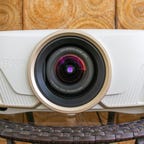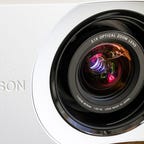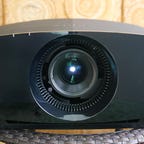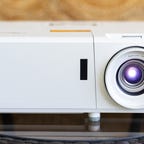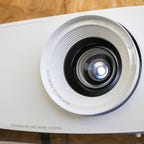Best 4K Projector for 2024
These models offer a huge 4K projection for the ultimate home theater. Here are the best projectors we've reviewed.
What to consider
Picture quality
The two most important factors which influence picture quality are contrast ratio and brightness A projector with a great contrast ratio will look better than a brighter projector, though the latter will perform better if you want to watch with some lights on.
Specifications
Though they're important, many companies tend to inflate contrast and brightness specs so use them only as a rough guide.
Budget
Expect to pay around $3k for a quality 4K projector, though models do start around $1K.
Features
The most handy features you can opt for are lens shift and zoom which make a projector easier to setup.
Our Picks
While the latest TVs are impressive, they aren't the only way to enjoy your favorite shows and movies. If you're a movie fanatic who needs a home theater experience, it's worth looking at 4K projectors. They can give you a bigger image than you'd get with a TV, and you'll find that some 4K projectors are surprisingly affordable.
If you're ready to take your home theater to the next level, here are the best projectors you can get for 4K content based on hours of comparison testing. Check out our list of the best home theater projectors for more, often less expensive, options if 4K HDR isn't your top priority. Or you could find a portable projector to take on the go.
What is the best 4K projector overall?
The Epson Home Cinema 5050UB is the best 4K projector overall because it has the perfect balance between image quality and price. Yes, you are paying more than you would for a 1080p projector, but the boost in image quality makes it more than worthwhile. If you're looking for a projector that is more budget-oriented, then try the excellent Optoma UHZ50, which uses a laser light source and has a high contrast ratio for a DLP design.
The Epson Home Cinema 5050UB boasts an excellent contrast ratio, impressive brightness, accurate color and better detail than what's possible with a 1080p projector. This UHD projector isn't cheap, but it offers a significant step up in image quality over other 4K projectors. Extensive lens shift and a motorized zoom are the icing on the cake.
Best 4K laser projector
Epson Home Cinema LS11000
The Epson LS11000 uses an entirely different technology to create light: lasers! Most other projectors use UHP lamps instead, which are glorified light bulbs. The LS11000's laser light source allows it to create a bright, colorful image with faster startup and shutdown times, no lamp replacement and a better dynamic contrast ratio. While it is more expensive compared with the HC5050, over the life of the projector, they'll cost about the same. The 5050 performs better in a few areas, but overall the LS11000 creates a deeply colorful, highly detailed image.
Best 4K projector, money no object
Sony VPL-VW325ES
The Sony VPL-VW325ES is a thoroughbred among ponies, a Porsche among Volkswagens, an absolute stunner with a price tag to match. The contrast ratio, easily the most important aspect of overall picture quality, is better than the Epson 5050 and significantly better than any projector that doesn't cost significantly more. And that's saying something, since the Sony itself costs significantly more than any other projector on this list. If price is no object, the 4K resolution picture quality is incredible. Though the Sony VPL-VW325ES has been discontinued, you can still find it on sale in new condition.
Best budget 4K laser projector
Optoma UHZ50
The Optoma UHZ50, like the Epson LS11000, uses a laser to create light. The UHZ50's blue laser is paired with a yellow phosphor, and the result is a bright, vibrant image. Detail is fantastic, and it turns on and off quickly, making it easy to live with. It's also relatively quiet. The contrast ratio is very good for a DLP projector, but not as good as the LCD and LCOS projectors on this list. The small, inexpensive-looking case also has minimal zoom and lens shift, making it harder to fit in some rooms than the Sony and Epson options in this roundup. Overall, though, this is a great projector.
Best budget 4K projector
Optoma UHD35
The UHD35 packs a lot into its tiny case and low price. It can throw a ton of light, produces accurate colors and has great detail. The contrast ratio isn't great, but it's pretty average among 4K projectors in this price range. And that price really is the UHD35's biggest selling point. It offers great picture quality for only a few hundred dollars over the best 1080p projectors. It doesn't offer lens shift or much in the way of zoom, but if it fits in your room, it's a great way to get 4K on a budget.
Other projectors we tested
Anker Nebula Cosmos Laser 4K: Since it has a handle and a compact size, the Cosmos Laser 4K is technically portable, but there's no battery, so you'll need to plug it in. It's also nice and bright, but the other downsides -- lack of zoom, average overall image quality and a steep price for what you get -- keep it off the list. Read our Anker Nebula Cosmos Laser 4K Projector review.
LG HU810PW: The HU810PW costs about the same as the Optoma UHZ50 and is also a laser-powered DLP projector with 4K resolution. It has better lens shift and zoom and is quieter. However, the contrast ratio is poor, so it doesn't look nearly as good overall as other 4K projectors we've tested. Read our LG HU810PW review.
Epson Home Cinema 2250: The HC 2250 is an excellent 1080p LCD projector. It won't look nearly as detailed as any of the projectors in this list, but it's bright and looks great otherwise. It's also a lot cheaper. Read our Epson Home Cinema 2250 review.
BenQ HT2050A: The HT2050 has been one of our favorite home theater projectors for several years. Which is to say, it's not new. So it's not as bright as some other options, nor is it 4K. However, it looks fantastic and is relatively inexpensive. Read our BenQ HT2050A review.
Factors to consider when choosing a 4K projector
Picture quality: Projectors lag behind TVs when it comes to overall picture quality. However, they largely make up for it with absolutely massive images. Want a TV that's 100 inches or more? Only a projector can do that, if you're not ultrarich. Even so, there's a wide range of picture quality even among projectors of a similar price. A projector with a great contrast ratio but only average light output is going to look better than the opposite. However, a brighter projector will be easier to see with some lights on and can create an even bigger image.
Where are you using it?: For light-controlled rooms and home theaters, a projector with a high contrast ratio is better than one that prioritizes light output. For mixed-use rooms where it'll be hard or impossible to totally control the ambient light, or if you want an outdoor movie night with an image the size of the side of your house, one that prioritizes light output will be better because the contrast ratio won't be as noticeable.
What about X spec?: Ignore the specs. Companies claim million-to-one contrast ratios, insane brightness ratings and more. But the specs are largely divorced from reality. A claimed 2,000-lumen projector is probably brighter than a 500-lumen projector, but 1,500- and 1,700-lumen projectors are probably the same.
How much should you spend?: 4K projectors start at about $1,000, but these tend to be compromised picture-wise, so expect to spend around $3,000 for a quality one.
What features should you look for?: If you're connecting the projector to an audio system (and you should, either receiver/speakers or soundbar), then you don't really need many features in the projector itself. Just get one that has great picture quality and high brightness. Lens shift and zoom are handy if you want more flexibility in placement.
How we test 4K projectors
CNET puts projectors through a rigorous and unbiased testing process that's the culmination of more than two decades of projector reviews. We use specialized test equipment, including a Photo Research spectroradiometer, a Minolta LS-100 luminance meter and an AEMC CA813 illuminance meter. The data is collected and collated by Portrait Displays CalMan Ultimate software, which helps us evaluate every PJ we review. Every lamp-based projector is "burned in" for 50 hours before measuring, and all projectors are initially set up using their most accurate color temp and color modes. Test patterns, sent from CalMan, are then used to adjust the various picture settings so the projector looks its best before measurement and evaluation. Contrast ratios are measured in each lamp and iris mode (when available). Once the projectors are fully set up and objectively measured, we watch a variety of content, including TV, movies and games, both with the projector by itself, and compared side-by-side with two direct competitors.
Broadly speaking, we're looking for the three picture quality aspects: contrast ratio, overall light output and color reproduction. Contrast ratio is the most important part of any projector's performance. It's the difference between the darkest part of the image and the brightest. While certain TV technologies, like OLED, can create a black that's the actual absence of light, no projector technology can do this. Because of this, contrast ratios with projectors are far lower. It's the difference between a washed out and "flat" image and one that's more lifelike and "pops." The better projectors will have a measured contrast ratio in the thousands. Most are between 500 and1,000:1.
Light output is the second most important factor, because it's not only how bright the image appears on your wall, but also how big an image you can produce. Most modern projectors are significantly brighter than projectors from even 10 years ago. We measure brightness in candelas per square meter (cd/m2) and then convert to estimated lumens for ease of comparison. It's important to note that we use the most accurate color temperature mode for our brightness comparisons, but we'll note when a less-accurate mode is significantly brighter. Most of the projectors we test are between 1,000 and 2,000 lumens, with battery-powered models far less, and some specialized projectors even higher.
Color accuracy is the last major factor. No projector can truly take advantage of HDR or wide color gamut, but some can do more than others. Generally, we're satisfied with accurate colors, but adding HDR effects is a bonus. Most home theater projectors we test are fairly accurate. Budget models, those that prioritize brightness over everything, and PJs from newcomers to the projector space often have wildly inaccurate colors that result in a very unnatural image.
Other factors, like video processing and HDR processing, are evaluated in the viewing tests. These are rarely a major factor in projector performance, but some models still use older chips that have issues.
The best projector will have a high contrast ratio, high brightness and great color. Those are difficult to do at the same time, but as long as the balance works and it looks better than its competitors at a similar price, it's a winner.
For more info, check out how CNET tests projectors.


